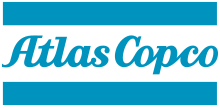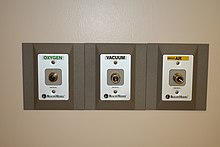
Investor AB is a Swedish investment and holding company, often considered a de facto conglomerate. One of Sweden's largest companies, Investor AB serves as the investment arm of the prominent Swedish Wallenberg family; the family's companies are involved in a variety of industries, of which the primary industries are pharmaceuticals, telecommunications and industry.
Compressed air is air kept under a pressure that is greater than atmospheric pressure. Compressed air is an important medium for transfer of energy in industrial processes, and is used for power tools such as air hammers, drills, wrenches, and others, as well as to atomize paint, to operate air cylinders for automation, and can also be used to propel vehicles. Brakes applied by compressed air made large railway trains safer and more efficient to operate. Compressed air brakes are also found on large highway vehicles.
Dresser Industries was a multinational corporation headquartered in Dallas, Texas, United States, which provided a wide range of technology, products, and services used for developing energy and natural resources. In 1998, Dresser merged with its main rival Halliburton. Halliburton sold many of former Dresser non "oil patch" divisions, retaining the M W Kellogg Engineering and Construction Company and the Dresser oil-patch products and services that complemented Halliburton's energy and natural resource businesses. In 2001 Halliburton sold five separate, but somewhat related former Dresser non "oil patch" divisions, to an investment banking firm. Those five operations later took the name "Dresser Inc." In October 2010, Dresser Inc., was acquired by General Electric. It is headquartered in Addison, Texas.

Sandvik AB is a Swedish multinational engineering company specializing in products and services for mining, rock excavation, rock drilling, rock processing, metal cutting and machining. The company was founded in Gävleborg County, Sweden, in 1862. In 2023, it had approximately 41,000 employees and a revenue of 127 billion SEK, with sales in around 170 countries.

Baker Hughes Company is an American energy company based in Houston, Texas. As one of the world's largest oil field services companies, it provides products and services for oil well drilling, formation evaluation, completion, production, and reservoir consulting. It operates in over 120 countries, with research and manufacturing facilities in Australia, Singapore, Malaysia, India, Dubai, Saudi Arabia, Italy, Germany, Norway, Oklahoma, Louisiana and Missouri. From 2017 to 2020, the company was majority owned by General Electric (GE); however, GE no longer owns an economic stake in the company. The company is incorporated in Delaware.

A jackhammer is a pneumatic or electro-mechanical tool that combines a hammer directly with a chisel. It was invented by William McReavy, who then sold the patent to Charles Brady King. Hand-held jackhammers are generally powered by compressed air, but some are also powered by electric motors. Larger jackhammers, such as rig-mounted hammers used on construction machinery, are usually hydraulically powered. These tools are typically used to break up rock, pavement, and concrete.

Pentair plc (PNR) is an American water treatment company incorporated in Ireland with tax residency in UK, with its main U.S. office in Golden Valley, Minnesota. Pentair was founded in the US, with 65% of company's revenue coming from the US and Canada as of 2017. PNR was reorganized in 2014, shifting the corporate domicile from Switzerland to Ireland.

Dover Corporation is an American conglomerate manufacturer of industrial products. The Downers Grove, Illinois-based company was founded in 1955. As of 2021, Dover's business was divided into five segments: Engineered Products, Clean Energy and Fueling, Imaging & Identification, Pumps & Process Solutions and Climate and Sustainability Technologies. Dover is a constituent of the S&P 500 index and trades on the New York Stock Exchange under "DOV." Dover was ranked 445 in the 2023 Fortune 500. The company relocated its headquarters to Illinois from New York in mid-2010.
Ingersoll Rand Inc. is an American multinational company that provides flow creation and industrial products. The company was formed in February 2020 through the spinoff of the industrial segment of Ingersoll-Rand plc and its merger with Gardner Denver. Its products are sold under more than 40 brands across all major global markets.
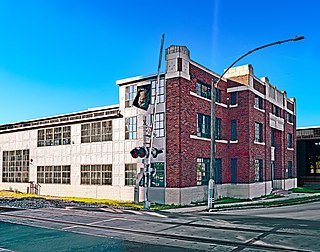
Cameron International Corporation (formerly Cooper Cameron Corporation (CCC) and Cooper Oil Tool, Cameron Iron Works) though now operating under Schlumberger, is a global provider of pressure control, production, processing, and flow control systems as well as project management and aftermarket services for the oil and gas and process industries. Cameron was acquired by Schlumberger (SLB) in 2016, and now operates as 'Cameron, an SLB Company.' At the start of the SLB acquisition in 2015, Cameron employed approximately 23,000 people and delivered $9.8 billion in revenue.
Trane Technologies plc is an American manufacturing company focused on heating, ventilation, and air conditioning (HVAC) and refrigeration systems. The company traces its corporate history back more than 150 years and was created after a series of mergers and spin-offs. In 2008, HVAC manufacturer Trane was acquired by Ingersoll Rand, a US industrial tools manufacturer. In 2020, the tools business was spun off as Ingersoll Rand and the remaining company was renamed Trane Technologies.

Edwards Ltd is a British multinational vacuum pump and exhaust gas management systems manufacturer. Its headquarters are in Burgess Hill, UK, and has been part of the Atlas Copco Group since 2014. Edwards holds 1,700 patents, including for dry (oil-free) vacuum pumps, and produces equipment used for manufacturing semiconductors, scientific research, freeze drying and other industries. Its pumps remove contaminants at CERN's Large Hadron Collider. Manufacturing is predominantly handled by subsidiary businesses in the Czech Republic, South Korea, USA and China. Edwards' global research and development facilities remain in the UK.
Chicago Pneumatic, also known as "CP", is an industrial manufacturer providing power tools, air compressors, generators, light towers and hydraulic equipment. Products are sold in more than 150 countries through a worldwide distribution network. CP is active on markets such as tools for industrial production, vehicle service, maintenance repair operation for mining, construction, infrastructure equipment.
Enpro is a US-based industrial technology company that designs and manufactures products and materials for technology-intensive sectors. The company serves industries such as semiconductors, aerospace, power generation, heavy-duty trucking, agricultural machinery, chemical processing, pulp and paper, and life sciences from 61 primary manufacturing facilities located in 12 countries, worldwide. It is organized under three segments: Sealing Technologies, Advanced Surface Technologies, and Engineered Materials.
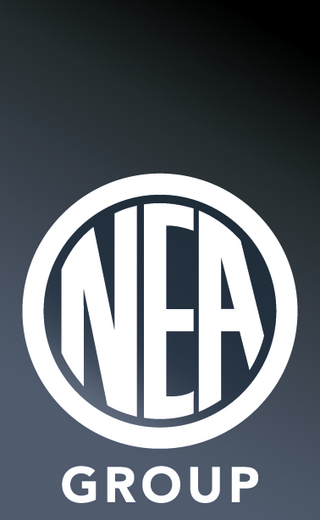
NEUMAN & ESSER GROUP was founded as a family establishment in Aachen, Germany in 1830. NEA is a manufacturer of reciprocating compressors and grinding systems for several industries, including oil and gas, chemical and petrochemical, food industry and renewable energy.
Sullair is a major American manufacturer of portable and stationary rotary screw air compressors designed for commercial and industrial use. Founded in 1965 in the town of Michigan City, Indiana U.S.A., Sullair has manufacturing facilities in Michigan City that distribute and service air compressor packages and systems worldwide. Sullair also has manufacturing facilities in Suzhou, Jiangsu and Shenzhen, Guangdong China that service the Asian and Australasian markets. Sullair also has offices in Dandenong South, Australia near Melbourne, and in Sunderland, United Kingdom that services markets in the EMEA and Russia.

Leybold GmbH, based in Cologne, is part of the Swedish industry group Atlas Copco. The company’s core competencies are based on the development of components and systems for the generation of vacuum and gas management engineering.
Kirloskar Pneumatic Company Limited (KPCL) is one of the core Kirloskar Group companies and was founded in 1958 by Shantanurao Laxmanrao Kirloskar. The company offers engineering products and is represented by offices across the globe. KPCL serves major sectors like Oil and Gas, Steel, Cement, Food and Beverage, Railways, Defense and Marine. Their product range includes air compressors, air conditioning and refrigeration systems, process gas systems, vapour absorption chillers and industrial gearboxes.
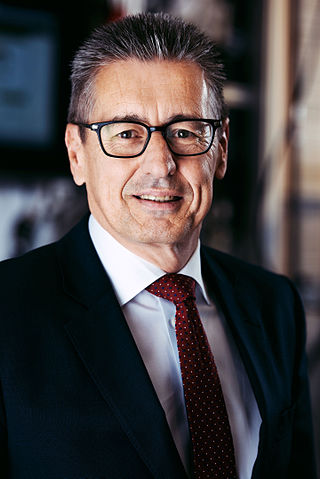
Ronnie Leten is a Belgian businessman. In 2018, Leten became the chairman of Ericsson and Epiroc.
Epiroc AB is a Swedish manufacturer of mining and infrastructure equipment. It is headquartered in Stockholm, Sweden and has its manufacturing facilities in Sweden, the United States, Canada, Australia, China, India, Japan, and Germany.
